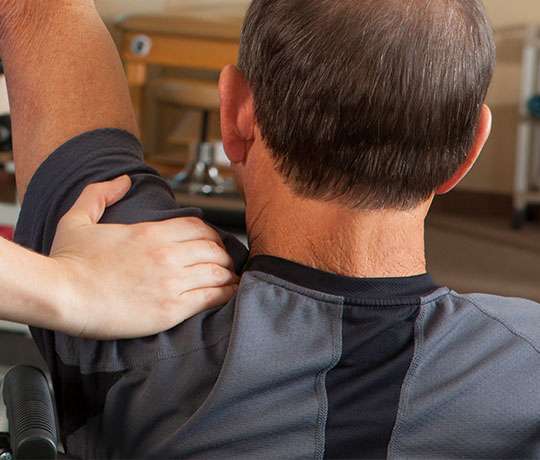What is a Behavioral Health Nurse?
The American Psychiatric Nursing Association defines psychiatric mental health nursing as “health and wellness promotion through identification of mental health issues, prevention of mental health problems and the care and treatment of persons with psychiatric disorders.”
We asked Anita Hufft, PhD, RN, and Dean of the College of Nursing at Valdosta State University a few questions to learn more from an expert in this growing nursing specialty. Her answers are below.
What’s great about working as behavioral health nurse?

I enjoy working with people and developing a relationship, helping them to see themselves and the world in a better way, adapt to those around them and feel cared for, important, useful and worthy. I also like the intellectual demands of analyzing behavior, motivation behind the behavior, and ways to change that behavior.
What are the drawbacks?
The biggest drawback is not having enough colleagues with sufficient preparation to make significant impact on client populations.
Where do behavioral health nurses work?
They work in acute care settings in emergency rooms and in medical surgical units with clients experiencing behavioral health crises – as liaisons. They also work in inpatient psychiatric hospitals, substance abuse treatment settings, residential facilities for developmentally delayed and mentally disabled, community based shelters, clinics and offices, and in collaboration with other health care providers as part of a setting for integrated primary and mental health care. In addition, they work with legislators, as educators, and in private practice.
What specific skills and traits do behavioral nurses need?
Dr. Hufft suggests these five traits to form the foundation:
- Good communication and relationship skills
- Ability to set boundaries, hold confidences, establish and maintain trust
- Social maturity, emotional stability, self confidence, and awareness of self along with sound and consistent ability to problem solve, manage stress and anxiety, and ask for help when needed
- Positive attitude toward clients with mental illness and other behavioral health problems
- Sufficient and appropriate assertiveness and professional acuity to manage the work environment in order to make it successful and prevent burnout and feelings of stress, isolation and/or frustration
Education and training help students to develop into qualified psychiatric nurses. Specialized skills for assessment of mental health include management of a milieu (physical and social setting), the ability to analyze and manage interactions of individuals and groups, and excellent psychiatric and pharmacological knowledge.
What kind of education/certification is required?
There are four levels according to Dr. Hufft:
- Basic level of psychiatric mental health nurse – RN license – RNs practice psychiatric mental health nursing with individuals in varied settings and occupy a number of roles, such as case managers, staff nurses, and nurse managers.
- Basic level certified mental health registered nurse – this level requires a minimum of a BSN degree, past work experience and continuing professional education/development in the chosen specialty. Certification also involves attaining professional standards of information and experience in the concentration and passing a specialty test, documenting a minimum of hours supervised working in the specialty.
- Advance Practice Registered Nurse – Psychiatric Mental Health – this level requires a minimum of a master’s degree in psychiatric nursing – the APRN-PMH applies skills and education to convoluted mental health issues. The term APRN-PMH can apply to the nurse practitioner or the clinical nurse specialist and both must meet specialized criteria (pass a test, document supervised clinical hours in the role, etc.).
- Advanced Practice Registered Nurse – Psychiatric Mental Health – Certified Specialist – this title indicates a board certified advanced practice in the concentration by either a nurse practitioner or a clinical nurse specialist. In addition, nurses at this level may be able for prescribe drugs to patients, have inpatient admission privileges, receive third party reimbursement, and other specialty privileges.
How do the job prospects look for the next several years?
Job prospects in all areas of nursing should be good as long as the health care system and the economy are positioned to value and support mental health care. The need for psychiatric and mental health care far exceeds the supply of health care providers, especially in the area of nursing. Are more jobs likely to be created? Yes – especially in the area of advanced practice.
Useful Resources
Psychiatric nurses are specially trained nurses who care for the psychological and physical well-being of people with mental health conditions or behavioral problems.
In this article, we explore what psychiatric nurses do, their education and training, how they differ from other mental healthcare workers, and the conditions that they treat.
We also explain how and when to seek mental health help from a psychiatric nurse or other mental health professional.
What do they do?

Share on Pinterest
1182704906 Image credit: FG Trade / Getty Images.
Psychiatric mental health nurses (PMHNs) work to improve or support the mental and physical well-being of people with mental health or behavioral conditions.
They may also support the people close to a person with these conditions, such as family members or romantic partners.
According to the American Psychiatric Nurse Association, PMHNs may work with individuals, groups, families, and communities.
They assess mental health needs and develop a nursing plan of care. Then they implement the plan and evaluate its effectiveness over time.
Jobs they do
The jobs that a PMHN does will depend on their clients’ needs, the healthcare setting, and their own specific training.
A PMHN’s job may include:
- assessing dysfunction and observing and evaluating progress
- helping people regain or improve coping abilities
- administering psychotropic medications and helping monitor and manage their side effects
- promoting factors and environments that help prevent further disability
- promoting general health
- assisting with self-care activities
- administering and monitoring psychobiological treatment regimens
- providing health education, such as psychoeducation
- assisting with crisis intervention or management
- offering basic counseling, such as general guidance or other types of interpersonal support
- carrying out the role of case manager to help coordinate and support care with other healthcare professionals
- participating with clients in recreational activities
- conducting group or family therapy sessions
- helping educate families and other interpersonal support members about mental health issues and lifestyle factors that may help improve or worsen someone’s condition
Where they work
PMHNs work in a variety of healthcare settings alongside other healthcare professionals.
Common work settings for a PMHN include:
- inpatient and outpatient general and psychiatric hospitals
- doctors’ offices
- assisted living facilities
- long-term care centers
- rehabilitation centers
- private homes
- correctional facilities
- community mental health centers
- local, state, and federal mental health agencies
- private clinics
- schools and colleges of nursing
- behavioral care companies
- military clinics or hospitals
Clients they work with
PMHNs can work with almost every segment of the population. They may also obtain specialty training to work with specific populations, such as:
- children
- adolescents
- adults
- older people
- people with substance use disorders
- people with eating disorders
A PMHN may also specially train to work in forensics or as a consultant or liaison.
What conditions can they treat?
PMHNs cannot specifically treat any condition.
Instead, PMHNs work with other healthcare professionals, such as social workers, psychotherapists, and psychiatrists, to develop and implement plans of care.
Healthcare professionals design these plans to help people with mental health or behavioral conditions improve their general well-being and functioning.
A PMHN can, therefore, be involved in the care of almost anyone who has a mental or behavioral health condition that is negatively impacting their life and requires monitoring and maintenance care.
Education
Psychiatric nurses are registered nurses who work in the mental healthcare sector.
To become a registered nurse, a person must obtain one of three degrees and pass the registered nurse (RN) licensing examination in their state after graduating.
The three degree options for becoming an RN are:
- 2-year associate’s degree program in nursing
- 3-year diploma program in nursing
- 4-year university or college bachelor’s degree program in nursing
According to the American Psychological Association, a psychiatric nurse must also complete additional training in pharmacology, as well as the social and behavioral sciences.
After a person passes the RN licensing exam, they must also complete the following to become certified as a psychiatric nurse:
- 2 years of practice as a full-time RN
- a minimum of 2,000 hours of clinical experience in psychiatric mental health nursing within 3 years of passing the exam
- 30 hours of continuing education in psychiatric mental health nursing within 3 years of passing the exam
A registered nurse can complete additional training, such as a master’s or doctoral degree, to become an advanced practice registered nurse (APRN).
The salary of a PMHN depends on their level of experience and the amount of specialized training they have undergone.
PMHNs vs. other mental health workers
As PMHNs are nurses, they have different training than mental health professionals such as social workers, psychologists, and psychiatrists.
This unique training means that PMHNs may approach treatment differently, and this may change the type of care that someone receives.
For example, most PMHNs tend to explore environmental factors that influence mental health and help people develop stronger interpersonal relationships, rather than providing treatment using medication or psychotherapy.
As nurses, PMHNs work alongside healthcare workers with more advanced education, such as psychologists and psychiatrists, to offer support.
A PMHN is typically not qualified to perform more complex or involved elements of care, such as making formal diagnoses, coming up with advanced treatment plans, and prescribing medications.
A PMHN may obtain a master’s or doctoral degree in psychiatric mental health sciences to become a psychiatric mental health advanced practice registered nurse (PMH-APRN).
In this capacity, they can offer services that psychiatrists and psychologists do, such as prescribing medications, making formal diagnoses, and running their own practice.
How to get their help
A person seeking care for mental health should start by talking to their healthcare provider or contacting the Substance Abuse and Mental Health Services Administration (SAMHSA).
They may or may not need to see a PMHN specifically.
SAMHSA run a free, completely confidential 24/7 hotline that offers treatment referral and other information services in English and Spanish to people in the United States seeking mental healthcare and their families.
For help from SAMHSA, a person can dial 1-800-662-HELP (4357) or seek guidance online.
Alternatively, a person may search directly for a local psychologist or a local psychiatrist.
People seeking the care of a psychiatric nurse should talk with their doctor, who can refer them to an appropriate specialist.
Someone may also receive care from a PMHN if they are under the care of other mental health professionals.
Signs a person may need help
People who are experiencing negative side effects from mental health or behavioral conditions should seek help from a licensed mental healthcare professional.
A person should also seek help if they or their loved ones have potential warning signs of mental health conditions. These include:
- mood changes that are rapid or dramatic
- sleep changes
- appetite changes
- withdrawal and loss of desire to engage in activities
- trouble thinking and reduced functioning
- loss of interest in daily activities or hobbies
- feeling disconnected
- intense anxiety, nervousness, or fear that seems disproportionate
- irrational thinking
- odd or uncharacteristic behavior
Cost to see a PMHN
People with health insurance should contact their insurance provider to identify clinics in their local area that their plan covers.
How much someone pays to see a PMHN typically depends on the type of insurance and copayment they have for mental healthcare services. A copayment is an amount a person pays out of pocket for healthcare services that insurance covers. The amount depends on the particular service.
The amount that someone pays may also depend on the setting in which someone sees a PMHN.
For example, services may cost less in a public hospital than in a private clinic.
Referral services, such as those that SAMHSA offer, can give people who have low-coverage insurance or no insurance access to state-funded programs. These may offer free or reduced-cost services.
People can also ask their healthcare provider to refer them to facilities or clinicians that offer their clients a sliding-fee scale or accept Medicaid or Medicare.
Summary
Psychiatric mental health nurses (PMHNs) are registered nurses with specialized training that help assess, address, and monitor mental health and behavioral conditions.
They may work with individuals, families, groups, or communities.
Most PMHNs work with a team of other licensed mental healthcare workers.
A person should seek help or guidance from a mental healthcare professional if they or a loved one experiences unexplained or concerning symptoms. These can be any symptoms that negatively, rapidly, or dramatically affect elements of mood, behavior, thinking, or actions.



